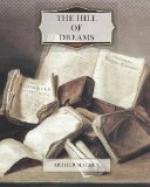In the curious labor of the bureau he found refreshment that was continually renewed. He experienced again, and with a far more violent impulse, the enthusiasm that had attended the writing of his book a year or two before, and so, perhaps, passed from one drug to another. It was, indeed, with something of rapture that he imagined the great procession of years all to be devoted to the intimate analysis of words, to the construction of the sentence, as if it were a piece of jewelry or mosaic.
Sometimes, in the pauses of the work, he would pace up and down his cell, looking out of the window now and again and gazing for an instant into the melancholy street. As the year advanced the days grew more and more misty, and he found himself the inhabitant of a little island wreathed about with the waves of a white and solemn sea. In the afternoon the fog would grow denser, shutting out not only sight but sound; the shriek of the garden gates, the jangling of the tram-bell echoed as if from a far way. Then there were days of heavy incessant rain; he could see a grey drifting sky and the drops plashing in the street, and the houses all dripping and saddened with wet.
He cured himself of one great aversion. He was no longer nauseated at the sight of a story begun and left unfinished. Formerly, even when an idea rose in his mind bright and wonderful, he had always approached the paper with a feeling of sickness and dislike, remembering all the hopeless beginnings he had made. But now he understood that to begin a romance was almost a separate and special art, a thing apart from the story, to be practiced with sedulous care. Whenever an opening scene occurred to him he noted it roughly in a book, and he devoted many long winter evenings to the elaboration of these beginnings. Sometimes the first impression would yield only a paragraph or a sentence, and once or twice but a splendid and sonorous word, which seemed to Lucian all dim and rich with unsurmised adventure. But often he was able to write three or four vivid pages, studying above all things the hint and significance of the words and actions, striving to work into the lines the atmosphere of expectation and promise, and the murmur of wonderful events to come.
In this one department of his task the labor seemed almost endless. He would finish a few pages and then rewrite them, using the same incident and nearly the same words, but altering that indefinite something which is scarcely so much style as manner, or atmosphere. He was astonished at the enormous change that was thus effected, and often, though he himself had done the work, he could scarcely describe in words how it was done. But it was clear that in this art of manner, or suggestion, lay all the chief secrets of literature, that by it all the great miracles were performed. Clearly it was not style, for style in itself was untranslatable, but it was that high theurgic magic that made the English Don Quixote,




